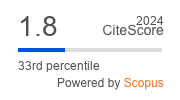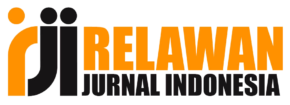Optimization Fuzzy Geographically Weighted Clustering with Gravitational Search Algorithm for Factors Analysis Associated with Stunting
Factor Analysis on Stunting using Fuzzy Geographically Weighted Clustering with Gravitational Search Algorithm
Abstract
Stunting is a significant threat to the quality of human resources in Indonesia because stunting does not only involve physical growth disorders but can also cause children to be vulnerable to disease and experience disorders of brain development and intelligence. Many factors cause stunting, not only malnutrition in pregnant women and toddlers. Grouping can be done to make it easier to see the characteristics of the factors causing stunting in Indonesia. The grouping is done based on the similarity of the characteristics of the factors causing stunting in each province. This study used Fuzzy Geographically Weighted Clustering (FGWC) with Gravitational Search Algorithm (GSA) to group and assess the best cluster using the Partition Coefficient validity index, Classification Entropy, Separation Index, Xie & Beni's Index, and IFV Index. Furthermore, a difference test was conducted to determine the dominant factor causing stunting in the formed cluster. The results showed that the FGWC-GSA gave the best clustering results on the fuzziness value of 2 with the number of clusters 2. Cluster 1 consisted of 16 provinces, and cluster 2 consisted of 18 provinces. Based on the T-test, the variables of infants who received exclusive breastfeeding had significant differences between clusters. Therefore, cluster 2 is a cluster that has dominant problems related to exclusive breastfeeding.
Downloads
References
Badan Pusat Statistik and Kementerian Kesehatan RI, Laporan Pelaksanaan Integrasi SUSENAS Maret 2019 dan SSGBI Tahun 2019. Jakarta: Badan Pusat Statistik, 2019.
Kementerian Kesehatan Republik Indonesia, Buku Saku Hasil Studi Status Gizi Indonesia (SSGI) Tingkat Nasional, Provinsi, dan Kabupaten/Kota Tahun 2021. Jakarta: Kementerian Kesehatan Republik Indonesia, 2021.
Khairani, “Situasi Stunting di Indonesia,” Jendela data dan Inf. Kesehat., vol. 208, no. 5, pp. 1–34, 2020, [Online]. Available: https://pusdatin.kemkes.go.id/download.php?file=download/pusdatin/buletin/buletin-Situasi-Stunting-di-Indonesia_opt.pdf.
D. Satriawan and D. A. Styawan, “Pengelompokkan Provinsi di Indonesia Berdasarkan Faktor Penyebab Balita Stunting Menggunakan Analisis Cluster Hierarki,” J. Stat. dan Apl., vol. 5, no. 1, pp. 61–70, 2021, doi: https://doi.org/10.21009/JSA.05106.
S. P. Tamba, M. D. Batubara, W. Purba, M. Sihombing, V. M. Mulia Siregar, and J. Banjarnahor, “Book data grouping in libraries using the k-means clustering method,” J. Phys. Conf. Ser., vol. 1230, no. 1, p. 012074, Jul. 2019, doi: 10.1088/1742-6596/1230/1/012074.
R. E. Caraka et al., “Micro, small, and medium enterprises’ business vulnerability cluster in indonesia: An analysis using optimized fuzzy geodemographic clustering,” Sustain., vol. 13, no. 14, 2021, doi: 10.3390/su13147807.
V. K. Malhotra, H. Kaur, and M. A. Alam, “An Analysis of Fuzzy Clustering Methods,” Int. J. Comput. Appl., vol. 94, no. 19, pp. 9–12, 2014, doi: 10.5120/16497-6578.
S. H. Gebreyesus, D. H. Mariam, T. Woldehanna, and B. Lindtjørn, “Local spatial clustering of stunting and wasting among children under the age of 5 years: implications for intervention strategies,” Public Health Nutr., vol. 19, no. 8, pp. 1417–1427, Jun. 2016, doi: 10.1017/S1368980015003377.
W. Sartika, S. Suryono, and A. Wibowo, “Information System for Evaluating Specific Interventions of Stunting Case Using K-means Clustering,” E3S Web Conf., vol. 202, p. 13003, Nov. 2020, doi: 10.1051/e3sconf/202020213003.
G. A. Mason and R. D. Jacobson, “Fuzzy Geographically Weighted Clustering,” Proceeding 9th Int. Conf. Geocomputation, pp. 1–7, 2007.
I. H. Pamungkas and S. Pramana, “Improvement Method of Fuzzy Geographically Weighted Clustering using Gravitational Search Algorithm,” J. Ilmu Komput. dan Inf., vol. 11, no. 1, pp. 10–16, Feb. 2018, doi: 10.21609/jiki.v11i1.580.
B. I. Nasution, R. Kurniawan, T. H. Siagian, and A. Fudholi, “Revisiting social vulnerability analysis in Indonesia: An optimized spatial fuzzy clustering approach,” Int. J. Disaster Risk Reduct., vol. 51, 2020, doi: 10.1016/j.ijdrr.2020.101801.
V. Herlinda, D. Darwis, and Dartono, “Analisis Clustering untuk Recredesialing Fasilitas Kesehatan menggunakan Fuzzy C-Means,” J. Teknol. dan Sist. Inf., vol. 2, no. 2, pp. 94–99, 2021.
J. F. Hair JR, W. C. Black, B. J. Babin, and R. E. Anderso, Multivariat Data Analisys, Seventh. New York: Prantice Hall International, 2010.
S. N. Abdussamad, S. Astutik, and A. Efendi, “Fuzziness Evaluation on Hybrid Context Based Clustering Methods with Fuzzy Geographically Weighted Clustering-Particle Swarm Optimization Algorithm,” J. Phys. Conf. Ser., vol. 14, no. 1, pp. 10–15, 2021, doi: 10.1088/1742-6596/1811/1/012087.
A. W. Wijayanto and A. Purwarianti, “Improvement of fuzzy geographically weighted clustering using particle swarm optimization,” in 2014 International Conference on Information Technology Systems and Innovation (ICITSI), Nov. 2014, pp. 7–12, doi: 10.1109/ICITSI.2014.7048229.
T. Eldos and R. Al Qasim, “On The Performance of the Gravitational Search Algorithm,” Int. J. Adv. Comput. Sci. Appl., vol. 4, no. 8, pp. 74–78, 2013, doi: 10.14569/ijacsa.2013.040811.
B. Lazzerini, L. C. Jain, and D. Dumitrescu, Fuzzy Sets & Their Application to Clustering & Training. USA: CRC Press, 2000.
Copyright (c) 2023 Jurnal RESTI (Rekayasa Sistem dan Teknologi Informasi)

This work is licensed under a Creative Commons Attribution 4.0 International License.
Copyright in each article belongs to the author
- The author acknowledges that the RESTI Journal (System Engineering and Information Technology) is the first publisher to publish with a license Creative Commons Attribution 4.0 International License.
- Authors can enter writing separately, arrange the non-exclusive distribution of manuscripts that have been published in this journal into other versions (eg sent to the author's institutional repository, publication in a book, etc.), by acknowledging that the manuscript has been published for the first time in the RESTI (Rekayasa Sistem dan Teknologi Informasi) journal ;








